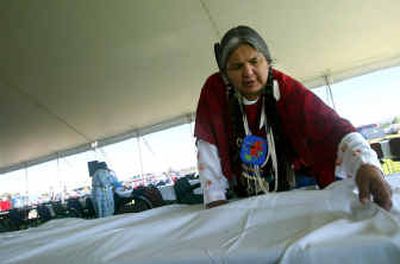Tribes mark 150 years since treaties

PENDLETON, Ore. – Antone Minthorn was just a 20-year-old college student when American Indian tribes in the Columbia River basin paused to recognize the 100th anniversary of their 1855 treaties with the U.S. government. At the time, he knew little about the treaties or their significance.
Not so, today. Minthorn, now pushing 70 and chairman of the Confederated Tribes of the Umatilla Indian Reservation, sees how times have changed. As tribes prepare to commemorate the treaties 150 years after the historic signings, the Indians have a voice like never before.
“We always need a voice in the politics of America. Otherwise, we will just be passed over like we have been in the past,” Minthorn said. “We needed to let the American public know that we are still here, we have survived this hammer of manifest destiny.”
Between 1854 and 1856, territorial Gov. Isaac Stevens traveled across land that makes up present-day Washington, Oregon, Idaho and Montana with the goal of signing treaties with Indian tribes and thereby opening the Pacific Northwest to settlement. The effort came to be known as the Treaty Trail.
Ten treaties were signed in just 13 months, relegating roughly 70 tribes to reservations. More than 20 of those tribes and bands will recognize the 150th anniversary of their treaties this summer in what is both a poignant reminder of what they lost and a celebration of their survival.
“We still need to educate people about who we are and how far we’ve come 150 years later,” said Arlen Washines, wildlife manager for the Yakama Nation and chairman of the committee planning 150th anniversary events.
The treaties were the culmination of years of fighting, sorrow and hurt for Pacific Northwest tribes, he said, and they represent tremendous sacrifice. All told, the tribes ceded millions of acres of land to the U.S. government, while retaining the right to hunt, fish and gather roots and berries.
For that very reason, many say that recognizing the treaties can be a delicate – and sometimes contentious – issue for tribal members.
Too often, the agreement is viewed as a surrender, Washines said.
“Even some of our tribal members look at the treaty as a piece of paper that identifies defeat,” Washines said. “But conquering nations do not sign treaties with those they overpower. This was no defeat.”
Carl Sampson, a Walla Walla ceremonial chief and descendant of Walla Walla Chief Peo-peo-mox-mox, who signed the treaty, echoed that point.
Although flying a white flag as a symbol of truce, Peo-peo-mox-mox was killed by U.S. soldiers months after the 1855 treaty signing. The chief was scalped, and his hands, feet and other body parts were cut off and put on display.
His descendants will never forget how Peo-peo-mox-mox died, Sampson said, adding, “Once something like this happens to an elder, his spirit groans forever.”
Just as important, though, tribal members celebrate the courage and foresight of their leaders 150 years ago as they look to the future, Sampson said. The tribes survived, thanks in large part to the difficult decisions of the past.
“Much of what we’re doing today is to preserve this information and knowledge for the future, so that as we train the next generation of leaders, we’re confident they have this knowledge.”
The very treaties that forced Indians onto reservations promise them rights that help to secure their futures, Minthorn said. Across the Northwest, tribes are using their treaties to prevent degradation of natural resources and protect the environment.
“Tribes are restoring and strengthening their tribes at the same time they are contributing to the welfare of their communities,” he said. “We’re not taking. We’re reclaiming our status as people, as a culture, as a nation.”
Not until 1934 did the federal government stop the allotment of tribal lands and give tribes the opportunity to form corporations to conduct business. In 1975, a self-determination act allowed tribes to govern themselves and contract for services by the federal government. The move broke much of the hold the government had on tribes.
In just the 30 years since then, the Confederated Tribes of the Umatilla have established their own farming and retail programs, resorts and casinos. They have taken control of their own economic development, Minthorn said.
The effort has only just begun. Tribes will continue to strengthen educational opportunities, improve their skilled labor forces, foster economic development and restore land and natural resources, he said.
“We’re just breaking out of that oppression that was set in by signing the treaty of 1855,” Minthorn said. “We have to be proactive. We have sovereignty, and sovereignty doesn’t do you any good unless you’re utilizing it.”